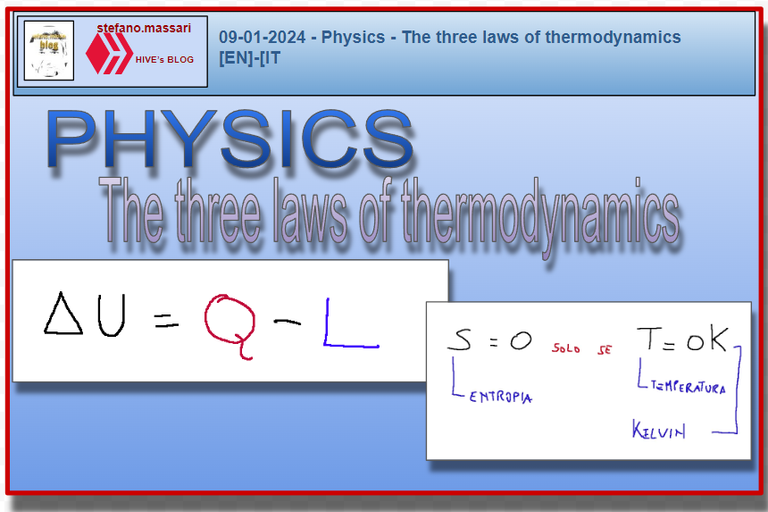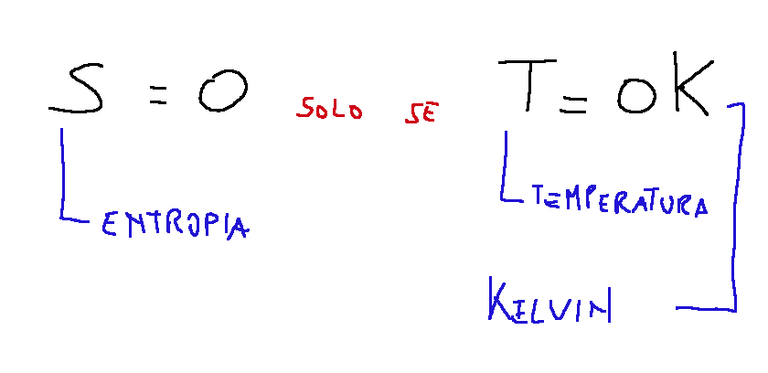09-01-2024 - Physics - The three laws of thermodynamics [EN]-[IT

~~~ La versione in italiano inizia subito dopo la versione in inglese ~~~
ENGLISH
09-01-2024 - Physics - The three laws of thermodynamics [EN]-[IT]
The three laws of thermodynamics
A long time ago it was already seen that two bodies at different temperatures, placed in contact, reached the same temperature within a period of time. Therefore it was already well known since ancient times that there could be a passage or exchange of heat between two bodies.
Thermodynamics is that branch of physics that studies the systems in which energy exchanges and transformations occur.
Another definition of thermodynamics.
Thermodynamics is the science that studies, from a macroscopic point of view, the modifications undergone by a system as a result of the transfer of energy, in the form of heat and work.
System
By system in thermodynamics we mean the quantity of matter, or a defined quantity of space, that we intend to study.
The walls that delimit the system are called control surfaces.
The environment, however, in the thermodynamic context, is everything that is external to the system, and is capable of interacting with it.
However, it is important to clarify what a closed system is. A closed system means that no mass exchanges with the environment are allowed.
First law of thermodynamics
The first law of thermodynamics identifies the conceptual equivalence between heat and mechanical work and identifies the existence of a form of energy that is the internal energy of a system.
In this principle therefore a new state function appears which is called internal energy.
Below is the expression of the first law of thermodynamics.

Second law of thermodynamics
Two statements are contained in this principle
-1-
it is impossible to create a thermodynamic cycle whose result is to transform everything into heat absorbed by a heat source completely into work. (Kelvin - Planck)
-2-
A thermodynamic cycle cannot be achieved in which heat can be transferred from a colder body to a hotter stage without the input of external work. (Clausius)
Third law of thermodynamics
It is not possible to reach absolute zero through a finite number of thermodynamic transformations.
Absolute zero is the lowest temperature a thermodynamic system is capable of reaching.
This principle is also called Nernst's principle, which stated that in a reversible transformation the entropy variation tends to zero as the absolute temperature tends to zero.
That is, entropy decreases and goes towards zero the closer we get to absolute zero.

Conclusions
Thermodynamics is based on three fundamental principles.
Request
Have you already heard of the German chemist Walther Hermann Nernst who formulated the third law of thermodynamics?

09-01-2024 - Fisica - Le tre leggi della termodinamica [EN]-[IT]
Le tre leggi della termodinamica
Tantissimo tempo fa si era già visto che due corpi a temperature differenti, posti a contatto, raggiungevano all'interno di un arco di tempo, la stessa temperatura. Quindi era già ben noto sin dall'antichità che tra due corpi potesse esserci un passaggio o scambio di calore.
La termodinamica è quel ramo della fisica che studia i sistemi in cui avvengono scambi e trasformazioni di energia.
Altra definizione della termodinamica.
La termodinamica è la scienza che studia, da un punto di vista macroscopico, le modificazioni subite da un sistema in conseguenza del trasferimento di energia, sotto forma di calore e lavoro.
Sistema
Per sistema in termodinamica di intende la quantità di materia, oppure una definita quantità di spazio, che si intende studiare.
Le pareti che delimitano il sistema vengono chiamate superfici di controllo.
L'ambiente invece, nell'ambito termodinamico, è tutto ciò che è esterno al sistema, ed è in grado di interagire con esso.
Importante invece è chiarire cosa è un sistema chiuso. Per sistema chiuso si intende che non vengono consentiti scambi di massa con l'ambiente.
Primo principio della termodinamica
Il primo principio della termodinamica identifica l'equivalenza concettuale tra calore e lavoro meccanico e identifica l'esistenza di una forma di energia che è l'energia interna di un sistema.
In questo principio appare quindi una nuova funzione di stato che si chiama energia interna.
Qui di seguito l'espressione del primo principio della termodinamica.

Secondo principio della termodinamica
In questo principio sono racchiusi due enunciati
-1-
è impossibile realizzare un ciclo termodinamico il cui risultato sia quello di trasformare tutto in calore assorbito da una sorgente di calore completamente in lavoro. (Kelvin - Planck)
-2-
Non si può realizzare un ciclo termodinamico in cui si può trasferire calore da un corpo più freddo a uno stadio più caldo senza l'apporto di lavoro esterno. (Clausius)
Terzo principio della termodinamica
Non è possibile raggiungere lo zero assoluto attraverso un numero finito di trasformazioni termodinamiche.
Lo zero assoluto è la temperatura minore che un sistema termodinamico sia in grado di raggiungere.
Questo principio è chiamato anche principio di Nernst, il quale affermava che in una trasformazione reversibile la variazione di entropia tende a zero al tendere a zero della temperatura assoluta.
Cioè l'entropia diminuisce e va verso lo zero quanto più ci si avvicina allo zero assoluto.

Conclusioni
La termodinamica si basa su tre principi fondamentali.
Domanda
Avevate già sentito parlare del chimico tedesco Walther Hermann Nernst che formulò il terzo principio della termodinamica?
THE END
Thank you for the class!
I still have a few things to tell about the physics topic
I’d be waiting for that
The three laws of thermodynamic govern how human lives daily
exactly, also here I also talked about the concept of entropy, entropy measures disorder... and entropy is equal to zero when the temperature is zero Kelvin
@tipu curate
Upvoted 👌 (Mana: 33/43) Liquid rewards.
Grazie per il tipu MAD. Sto cercando di fare dei post un po’ tecnici… ho molto da dire, ma potrei perdere molti followers… hahaha
I'm familiar with some of the laws you've shared on this wonderful field back when I used to read about theoretical physicists like Max Planck or Albert Einstein or Jon von neumann. I think thermodynamics will always be an interesting topic even to non physicists. Thanks for sharing.
Thanks for leaving this nice comment about physics. Thermodynamics today is also very important in the study of the energy consumption of buildings
Thanks for your contribution to the STEMsocial community. Feel free to join us on discord to get to know the rest of us!
Please consider delegating to the @stemsocial account (85% of the curation rewards are returned).
You may also include @stemsocial as a beneficiary of the rewards of this post to get a stronger support.
The three golden laws of thermodynamic
With these three laws all the classical studies of thermodynamics are supported. I agree that these are three very important principles to fully understand where thermodynamics starts from and what it studies
Forse ho sentito questo nome qualche volta mentre parlavo con alcuni compagni di università.
Devo ammettere che anch'io non ho sentito parlare spesso in passato o a scuola di Nernst.